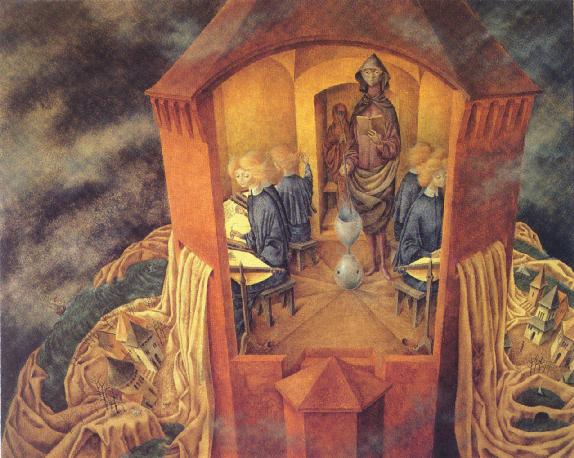here are some snippets from novels...
"Why so sad, my friend? What could be bothering you? You're young and strong, without any family to tie you down. ... No one thinks less of you because you were not born in these parts; in fact, everyone respects your conduct and your talents... You can read and write and figure... You have spirit; you have a good, logical head on your shoulders. And, on top of all that, you are the best-looking young man in town. Only twenty-four years old! I don't understand why you keep to yourself so much... You act as if you were better than everyone else, like we're not worthy of your company!" - George Sand, The Black City, 1860.
...
"... but much to his surprise he grew aware of a strange expansion of his inner being, a kind of restive anxiety, a fervent youthful craving for faraway places, a feeling so vivid, so new or else so long outgrown and forgotten that he came to a standstill and - hands behind his back, eyes on the ground, rooted to the spot - examined the nature and purport of the feeling.
It was wanderlust, pure and simple; but it pounced on him as a seizure, intensifying into a burst of passion, even a hallucination. His desire could virtually see, his ability to fantasize, unlulled since his hours of working, conjured up all the wonders and terrors, all the variety of the earth, which he strove to envision. He saw, saw a landscape, and monstrous, a primordial jungle of islands, morasses, and alluvial inletsl saw hariy palm shafts near and far striving upward out of rank and rampant ferns, realms of fat, swollen plants with fantastic blossoms; saw eccentrically misshapen trees plunging their roots through the air and into the ground, into stagnant waters reflecting green shadows; saw bowl-sized, milky white flowers drifting on surfaces and outlandish species of birds, with hunched shoulders and deformed beaks, standing in shallow liquids and inertly ogling sideways; saw the sparkling eyes of a couching tiger between the knotty canes of the bamboo thicket - and he felt his heart pounding with horror and enigmatic longing. Then the vision faded; and shaking his head, Aschenbach resumed his promenade along the fences of the gravestone yards." - Thomas Mann, Death in Venice, 1912.
...
"There hung the sense of buffering, insulation, she had notcied the abscence of an intensity, as if watching a movie, just perceptibly out of focus, that the projectionist refused to fix. And had also gently conned herself into the curious, Rapunzel-like role of a pensive girl somehow, magically, prisoner among the pines and salt fogs of Kinneret, looking for somebody to say hey, let down your hair. When it turned out to be Pierce she'd happily pulled out the pins and curlers and down it tumbled in its whisphering, dainty avalanche, only when Pierce had got maybe halfway up, her lovely hair turned, through some sinister sorcery, into a great unanchored wig, and down he fell, on his ass. But dauntless, perhaps using one of his many credit cards for a shim, he'd slipped the locked on her tower door and come up the conchlike stairs, which, had true guile come more naturally to him, he'd have done to begin with. But all that had then gone on between them had really never escaped the confinement of that tower. In Mexico City, they somehow wandered into an exhibition of paintings by the beautiful Spanish exile Remedios Varo: in the central painting of a triptych, titled "Bordando El Manto Terrestre,"
[see below] were a number of frail girls with heart-shaped faces, huge eyes, spun-gold hair, prisoners in the top room of a circular tower, embroidering a kind of tapestry which spilled out the slit windows and into a void, seeking hopelessly to fill the void: for all the other buildings and creatures, all the waves, ships and forests of the earth were contained in this tapestry, and the tapestry was the world. Oedipa, perverse, had stood in front of the painting and cried. No one had noticed; she wore dark green bubble shades. For a moment she'd wondered if the seal around her sockets were tight enough to allow the tears simply to go on and fill up the entire lens space and never dry. She could carry the sadness of the moment with her that way forever, see the world refracted through those tears, those specific tears, as if indices as yet unfound varied in important ways from cry to cry. She had looked down at her feet and known, then, because of a painting, that what she stood on had only been woven together a couple thousand miles away in her own tower, was only by accident known as Mexico, and so Pierce had taken her away from nothing, there'd been no escape. What did she so desire escape from? Such a captive maiden, having plenty of time to think, soon realizes that her tower, its height and architecture, are like her ego only incidental: that what really keeps her where she is is magic, anonymous and malignant, visited on her from outside and for no reason at all. Having no apparatus except gut fear and female cunning to examine this formless magic, to understand how it works, how to measure its field strength, count its lines of force, she may fall back on supersition, or take up a useful hobby like embroidery, or go mad, or marry a disk jockey. If the tower is everywhere and the knight of deliverance no proof against its magic, what else?" - Thomas Pynchon, The Crying of Lot 49, 1965.












